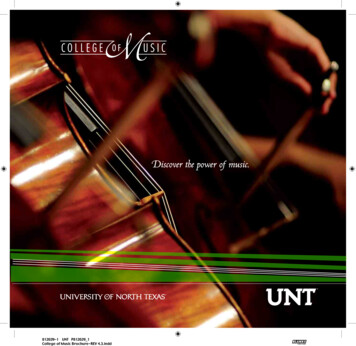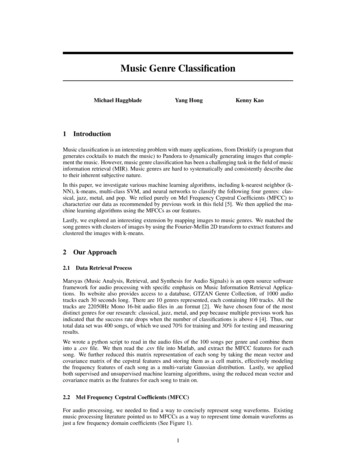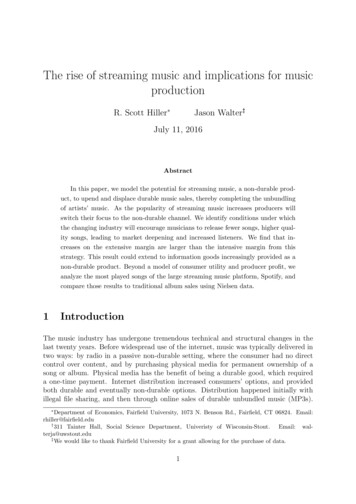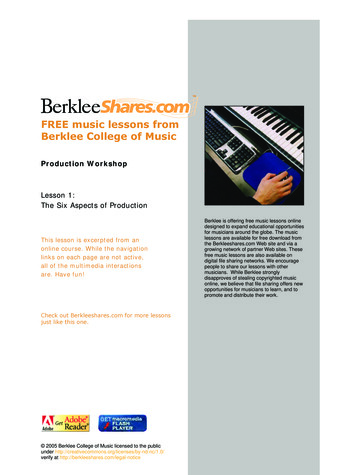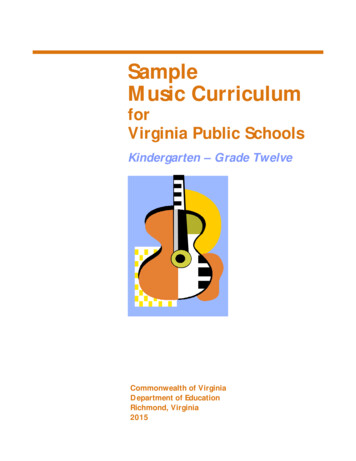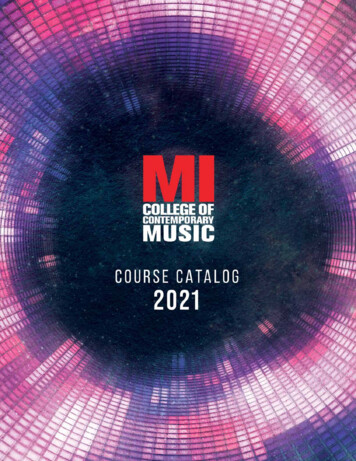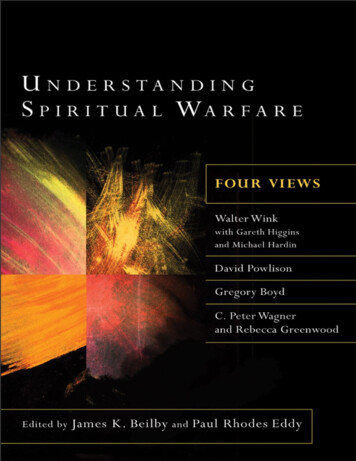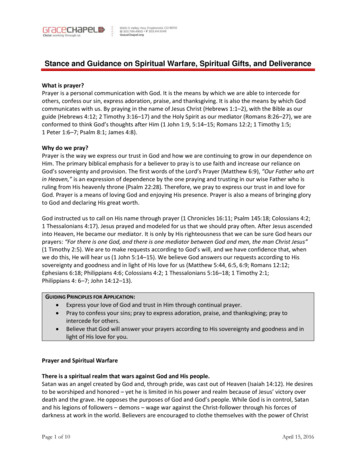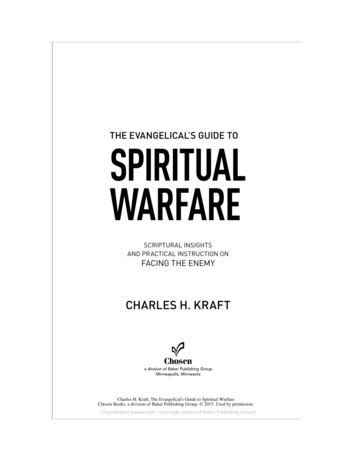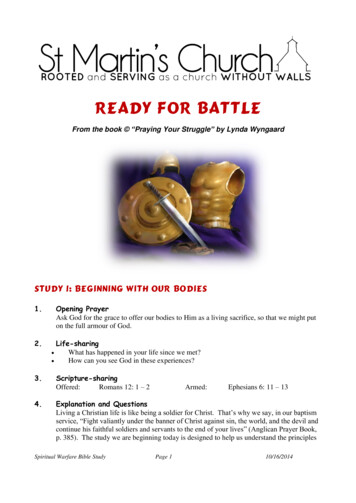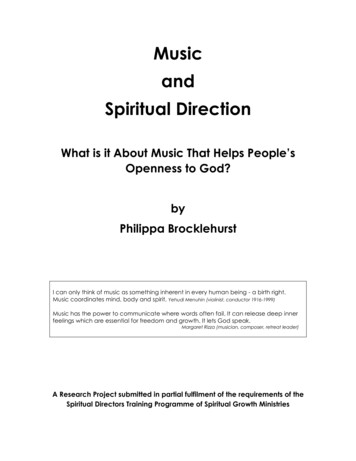
Transcription
MusicandSpiritual DirectionWhat is it About Music That Helps People’sOpenness to God?byPhilippa BrocklehurstI can only think of music as something inherent in every human being - a birth right.Music coordinates mind, body and spirit. Yehudi Menuhin (violinist, conductor 1916-1999)Music has the power to communicate where words often fail. It can release deep innerfeelings which are essential for freedom and growth. It lets God speak.Margaret Rizza (musician, composer, retreat leader)A Research Project submitted in partial fulfilment of the requirements of theSpiritual Directors Training Programme of Spiritual Growth Ministries
IntroductionMusic and openness to God are a marriage made in heaven. They mutuallyattract one another. One woman expressed it beautifully, “I appreciate that musiccalls me to a deeper place. It becomes a doorway into my own cathedral where Imeet God.”1 Spiritual Direction helps people be aware of and develop ways toconnect with God, to be open to themselves and to God in an atmosphere ofacceptance, warmth and hope. I am seeking to show that music has a significantplace in Spiritual Direction, and it must not be overlooked. Increased accessibilitythrough recent technology has brought new possibilities.Even though I teach music to children and young adults, it is only since engagingin this project that I have intentionally used it in my own prayer time and in SpiritualDirection.What is it about music that makes it so powerful? To address this, I appeal tomusicology, the neuroscience of music (much of it as recent as the last 15 to 20years) and the experience of several experienced Spiritual Directors (website andface to face interview ) and thirty-eight qualitative questionnaire participantsaged 23 to 83, all of whom identify as Christians. (Appendix 3 & 4). Finally, I willconsider how music can be used in a spiritual direction conversation.Why Music?Music is everywhere and for all time. No culture discovered so far lacks music insome form. “Throughout most of the world and for most of human history, musicmaking was as natural an activity as breathing and walking and everyoneparticipated”.2 Music, Levitin argues, is not simply a distraction or a pastime, but acore element of our identity as a species.3 Since mid-1900s more people havelistened to music than ever before. Technology has made it possible and isincreasingly making it more accessible with YouTube, Spotify, etc.Music processing is distributed throughout the brain. Our brains are made toreceive and process music. “Music listening, performance and compositionengage nearly every area of the brain that we have so far identified and involvenearly every neural subsystem.”4 Different aspects of music are handled bydifferent regions. Images in Appendix A illustrate this well.1Donelda Seymour Using Music as a Contemplative Exercise ative-exercise2Daniel Levitin This is Your Brain on Music Atlantic Books p.63Daniel Levitin The World in Six Songs PDF (WordPress.com) of a TED talk p54Daniel Levitin This is your Brain on Music Atlantic Books p.91 Spiritual Growth Ministries 2020
Different parts of our brain appreciate the structural aspects of music (pitch,melody, rhythm, harmony & tone colour) from the parts of our brain thatappreciate the emotional aspects of music. Hence a “musical” person(competent in reading, playing and singing music) can be indifferent to music,and a person who has never played an instrument and who is not familiar withmusic notation can be deeply affected by music. “Music calls to both parts of ournature – it is essentially emotional, as it is essentially intellectual.”5Listening alone, even without playing, “causes a cascade of brain regions tobecome activated.”6Music has the power to evoke emotions. The connection between music andemotion is well known through contemporary studies of the brain. We all know this,experientially, from movie soundtracks where suspense, drama, mystery and manyother emotions are intensified by the soundtrack. Lullabies have been around forhundreds of years. King David, around 1046BC, in Psalm150, says, “Praise Him witha blast of the ram’s horn, with lyre and harp, tambourine and dancing, strings andflute, and loud clanging cymbals.” The Psalms reflect many other emotions –disappointment, despair, anger, fear, guilt, peace, gratitude, joy etc. and severalquestionnaire participants mention the personal value of Psalms set to music inconnecting with God.Music has the power to heal emotions. David soothed Saul in his depression andfear by playing his harp I Samuel 16:14-23. “Whenever the tormenting spirittroubled Saul, David would play the harp. Then Saul would feel better, and thetormenting spirit would go away.” I Sam 16:23. “Music can modulate levels ofdopamine, the so-called feel-good hormone in the brain, elevating mood,boosting the immune system, and altering the brain chemistry associated withwellbeing and stress reduction.”7Music is Transformative“Music explores/uncovers the depths – our personal depths – and allows us toperceive ourselves and situations in ways that we don’t normally see them.”8Some quotes from participants in my survey:It builds a sense of confidence, courage and strength.5Oliver Sacks Musicophilia: Tales of Music and the Brain p285Daniel Levitin This is Your Brain on Music Atlantic Books p192 In a particular order: first auditory cortex forinitial processing of the components of the sound. Then the frontal lobes identified as being involved inprocessing musical structure and expectations. Finally, a network of regions-the mesolimbic system-involvedin arousal, pleasure, and the transmission of opioids and the production of dopamine, culminating inactivation in the nucleus accumbens. And the cerebellum and basal ganglia were active throughout,presumably supporting the process of rhythm and metre .Your brain on music is all about connections.7Daniel Levitin The World in Six Songs TEDxUSC 2012 You tube8Helen Bonny Music and Spirituality music Therapy Perspectives (2001) Vol. 1962 Spiritual Growth Ministries 2020
It allows me to more deeply understand myself.It allows me to express the previously inexpressible.I’m not in the same place as I was before hearing it.Gives me perspective.Music is Transcendent“Many of us feel that great music connects us to something larger than our ownexistence, to other people, or to God.”9“I hear my soul touch God’s spirit” – QuestionnaireIs Music for Everyone?UniversalAlmost all of us can intuitively perceive the basic elements of music: pitch, melodicshape, tone colour, harmony and rhythm.Different degrees of perception.We are all exposed to language from the start of our lives, but not all of us tomusic. That can influence our understanding and enjoyment of it as adults. By theage of 5, infants have formed schemas for the music they hear, built on the scalesthey are used to. That is why, for example, Indian music may seem strange to aWesterner’s ear and vice versa. Interestingly, of the seven “not really musical”people in my survey, only one did not find music helped them connect with God.They mentioned they had no exposure to music at home growing up andwondered if that might relate.Different Preferences.Musical preference is diverse. In my survey of 38 people, everyone chose adifferent “significant” piece to comment on. All of these pieces contained lyrics;almost all were “sacred music” in genre. When asked what other music wassignificant to them in their relationship with God, the list was much more diverse.Several people, of all ages, mentioned that music across all genres, helps theirheart, soul and spirit connect with God, especially classical music (no lyrics); butalso, movie soundtracks, musicals, love songs, hip-hop and rock. It seems there isenough variety in music that individual preference can be respected.Different degrees of Trusting Music’s Emotional PowerSome people are suspicious of the emotional power music can have over themand, for a variety of reasons, they don’t want to surrender or “let go” to it. Aparticipant of my survey, alluding to this, wrote, “I am aware that music has apower to move the emotions. So, I am cautious, as I seek more than an emotional9Daniel Levitin This is your Brain on Music Great Britain: Atlantic Books 2007 p2423 Spiritual Growth Ministries 2020
experience – I am seeking God Himself and long that His Spirit would reveal Him. Itis important to me that lyrics are biblical and based on truth. Otherwise I amunable to yield my soul and respond in worship.”I know for myself as a young person growing up, I was taught the logical sequence“fact, faith and feeling”. They were very much to be kept in that order and Igained the impression that emotion was to be distrusted as being very unreliable.Tolstoy adored Tchaikovsky’s music but often refused to listen to it because of it’spower to make him feel emotions that weren’t his own and not under his control.Freud similarly denied himself the pleasure of surrendering to music. “Somerationalistic, or perhaps analytic, turn of mind in me rebels against being moved bya thing without knowing why I am thus affected and what it is that affects me.”10Understanding How Music Affects UsWithin this diversity of preference for a variety of music genres, are there anyaspects to our encounter with music that are more likely to help us open up toGod? To attempt to understand this I will look at three components:1. The nature of the music itself (intrinsic) – its melody, harmony, rhythm,dynamics, tempo, tone colours, repetition and structure.2. The way music is received by us (extrinsic) – memories, ideas, concepts,associations represented by the music. The inclusion of lyrics will mean thereligious experience will lean toward extrinsic to the music.3. The context in which the music is heard i.e. church or concert, spiritualdirection/retreat/small group or individual listening.To help further illustrate these components I will share a recent experience for mewhich brings all these components together. I was feeling loaded with severalchallenging situations, and I asked my spiritual director if I could bring a piece oforchestral music, “Meditation” by Massenet, to our next session to be with Godtogether as we listened and let Him speak to my heart, as part of our timetogether. It is a beautiful violin solo with orchestral accompaniment. A young friendserenaded his bride with this music a few years ago as she walked toward him upthe aisle and I accompanied him on the piano – an extremely moving experience.So, in listening to it, I brought this memory with me and also the invitationalconcept of a bridegroom drawing his bride to himself, all of which is the extrinsiccomponent. The music itself has many beautifully nuanced long sounds that riseand fall, create tension and resolve. Emotional intensity is created as the tempoand dynamics increase and the accompaniment adds fuller harmonic support.10Freud The Moses of Michelangelo Introduction Quoted by Oliver Sacs Musicophilia p.2934 Spiritual Growth Ministries 2020
Occasionally a surprising, stronger sound pulls at the heart strings – all of which isthe intrinsic component. All sense of time stops, and I want to lose myself in thisspace. I experience Jesus so tenderly, with his arms outstretched, inviting me,drawing me closely to Himself, bearing my loads with me. I feel both weak at theknees yet strengthened. I already knew this music and was familiar with theemotion evoked by it. The context made it a significantly different experience forme. I was intentionally allowing God to be with me. It was both very personal andyet shared as I felt very supported in my listening to God with another personpresent. I deeply soaked in Jesus’s tenderness toward me. Kathleen Fischer says,“Emotions belong at the centre of spirituality, not at the edges. Spiritual directionnurtures emotional wholeness by inviting us to return again and again to thisunconditional divine embrace.”11Some questions arising out of these three components that can inform thepractice of spiritual direction are: Firstly, does the context in which the music isheard affect the strength of my experience? Secondly, how might thesecomponents affect the choice of music to facilitate openness to God? Why doessome music move us more than others? Is there any music that appeals to almosteveryone? To attempt to answer these questions I will draw on some research byPeter Atkins and Emery Schubert, “Are Spiritual Experiences Through Music Seen asIntrinsic or Extrinsic?”12 I will also draw on results from my questionnaire, my ownexperience as a Spiritual Director in training and Margaret Rizza, musician andcomposer.Atkins and Schubert concluded that the spiritual “comes to life” in music, whetherit draws on both intrinsic elements of music and extrinsic association, or one or theother. They concluded that experiences were stronger, more spiritual and moreemotional in a religious context, but that in a non-religious context experienceselicited similar features, just to a lesser degree.13 Non-religious context examplesgiven were at a concert or at home.In my questionnaire, church context was significant for 9 out of 38 people and theywere all over the age of 50. Context for 28 people was individual prayer time, foranother a spiritual direction session (only 2 go to SD), another a spiritual retreat. Mytentative conclusion, therefore, is that intentional time with God, wherever thatmight be, is important in opening up to God when listening to music.11Kathleen Fischer Working with the Emotions in Spiritual Direction: Seven Guiding Principles An article fromPresence, an International Journal of Spiritual Direction, Vol 12, No. 3, September 2006, pp26 - 3512Peter Atkins & Emery Schubert Are Spiritual Experiences through Music Seen as Intrinsic or Extrinsic?Religions 2014 ISSN 2077-144413Peter Atkins & Emery Schubert Are Spiritual Experiences through Music Seen as Intrinsic or Extrinsic?Religions 2014 ISSN 2077-14445 Spiritual Growth Ministries 2020
So, what about the choice of music for spiritual direction? When summarizing theresponses to a questionnaire question, “What are the elements of music thataffected you in your chosen significant piece?”, I wrote, “Music that enhances thewords, whether contemplative, triumphant, or anything in between”. What specificelements of music were mentioned? Melody was most important – rising andfalling, enabling heartfelt engagement. Repetition helped focus and a slowertempo allowed lingering. Dynamics profoundly affect emotions. “We are born witha predisposition toward interpreting sounds in particular ways.”14 Compare abrupt,short, loud sounds with longer, quieter sounds, which are so calming.To illustrate, I will relate an encounter with a directee, and then a continuation ofthe story two months later. My directee arrived looking drawn and lifeless. He hadnothing to talk about and was very anxious. So, I offered to play him “Calm meLord, as you calmed the sea” by Margaret Rizza. (I tend to think Margaret Rizza isfor everyone as her music so touches my heart). I gave him a copy of the words,though the words are few. God totally quieted his heart through it. He said, “Icould listen to this all day.” It created space for God to speak. Two months later heexpressed to me that the music I had played him wasn’t really his sort of music. Yethe said he loved it and it made him feel calm and peaceful. While I maybe shouldhave first asked him if he had some music/song he would like me to play that hefinds calming, there was much in the music, both intrinsically and extrinsically, thatevoked peace. Margaret Rizza says of her music, “I continue to write in thiscontemplative vein because I have so much moving and humbling feedback.Letters from people who are in deep depression, people who are terminally ill,people in prisons, people who find that the music connects with their prayer life.And then people who are not Christian but find themselves connecting with themusic in a perceptive way.”15 Perhaps some music is for almost everyone –simplicity, beautiful melody, floating varied instrumental descants, repetitive lyrics.I have attached (Appendix 1) a limited list of music that people have foundhelpful. Given diversity of preference, and also possible cultural diversity, which Ihaven’t attempted to address, there is much more music that could be included.What extrinsic aspects could I consider?In the questionnaire people have mentioned the following things as beingimportant to them: the passion with which the music is communicated, theauthenticity of the composer and the performer, quality of performance, lyrics1415Daniel Levitin This is Your Brain on Music Great Britain: Atlantic Books 2007 p 92Margaret Rizza https://www.margaretrizza.com/reflections-3.html6 Spiritual Growth Ministries 2020
being true to the scriptures, and lyrics not ringing true to experience. A listener’sbackground, experience and preference are important extrinsic considerations.Regarding authenticity, of Margaret Rizza’s music, Joyce Huggett, author of“Listening to God” and Retreat leader, in a review on Margaret Rizza’s website,says, ”Born of prayer and deep-down stillness, Margaret Rizza’s hauntingly beautifulmusic transports the listener into the presence of God.”Using Music in Spiritual DirectionAn Invaluable, Accessible ToolAccessibility of music these days allows music to be readily available to us in a SDconversation without disrupting the focus. You tube and Spotify enable almost anysong that enters the thoughts of the director or directee to be played.PreparationIn preparing my own heart for a conversation with a directee I find it helpful tolisten to music. For me I use one of Margaret Rizza’s chants e.g. Silent Surrendered.During the SessionMusic/song may come to the mind of the director or directee to reflect anemotion or to deepen experience. Here are a couple of examples:A directee wrote, “In a spiritual direction session I was drawing a picture to explorethe tension between light and dark, hope and despair. God was inviting me tojourney with Him through storms and beauty, together in a boat that provided asafe cocoon for me. God brought this song to mind – Sailboat by Brooke Fraser”.“Tell Him,” the love song passionately performed by Celine Dion and BarbraStreisand, also came to mind and was listened to in a spiritual direction session asan expression of mutual love, devotion and deep sense of connectedness withJesus. The directee pictured being in a dance with Jesus where “He was giving mecourage to love others with vulnerability and celebration.”A directee may bring music with them. A spiritual director shared with me how adirectee brought a recording of a piece of music she had written and thenrecorded, to a spiritual direction session. They played the recording and then sangit together. It was an “affirming of her gift” time, as their hearts were both touchedby the music they shared together. The directee realized others could benefit fromher gift. The director invited her to stay with the song recognizing it would becomea portal for God in her life.A directee may bring with them a personally significant piece of music, whichallows for cultural diversity. A directee spoke of the poignancy of the lyrics in the7 Spiritual Growth Ministries 2020
movie “Moana”. This movie has themes of place and identity, or Turangawaewae,an important value in New Zealand Maori culture, recognizing our belongingplace – marae, mountain, waterway – to be one where we are especiallyconnected and empowered. At the time, facing two big losses, that of herpersonal safe place and also of her identity following the birth of her stillborn firstchild, the directee was able to continue to grieve in the spiritual direction safespace, as she and her director listened together to the Moana song.16The director may offer the suggestion of the use of music with or without lyrics, asan optional idea for a directee’s individual prayer time.How to Use MusicListen together, then maybe silent reflection, staying with the emotion evoked,waiting for the directee’s response. Music so often becomes prayer.Possible deepening questions:What particularly got your attention? (particularly if there are lyrics)What emotions does that evoke for you?Where are you feeling that - what part of your body?Is there a colour you might link with this feeling?What does the music help you appreciate about God?What does the music help you realise/understand about yourself?What image or picture comes to mind for how you and God are just now?Would you like to have a go at putting it on paper? Is there a colour that matchesthe feeling? Is there a word you would like to add?What is God saying to you?How would you like to respond?16Moana Quote: “Sometimes the world seems against you. The journey may leave a scar. But scars can healand reveal just where you are,” were Moana’s Grandma’s words to her as she floated in a canoe in themiddle of the ocean, abandoned, with her calling challenged. “I am a girl who loves my island. I am a girlwho loves the sea. It calls me. I am a daughter of a village chief. We are descended from voyagers whofound their way across the world and they call me.”8 Spiritual Growth Ministries 2020
ConclusionWhat is it about music that helps us to be open to God? It is very clear that foralmost everyone, it functions in this way. Musicology and the neuroscience ofmusic give us much insight into the nature of and pervasive effectiveness of music.Beyond science, people’s experience of music strongly demonstrates that it hasboth transcendent and transformative effects. It helps us reach into a worldbeyond our own (transcendent) and it helps us reach deeply into our ownhearts(transformative). Music, of a variety of genres, lets God speak and we dowell to make a place for it in our Spiritual Direction practice, a place where heartsare opening up to God, and understanding of ourselves and experience of God isdeepened.9 Spiritual Growth Ministries 2020
BibliographyAtkins, Peter and Schubert, Emery, Are Spiritual Experiences through Music Seen as Intrinsicor Extrinsic. Religions 2014, 5,76-89; doi: 10.3390/rel5010076Barber, Meredith and Lipson, Julie, Finding the Voice Within. Presence: An InternationalJournal of Spiritual Direction Vol. 21 No. 4 December 2015Bonny, Helen Music and Spirituality. Music Therapy Perspectives (2001) Vol. 19 pp59-62Fischer, Kathleen, Working with the Emotions in Spiritual Direction: Seven Guiding Principles.Presence, An International Journal of Spiritual Direction, Vol 12, No. 3, September 2006 pp26– 35Foley, Edward, Music and Spirituality -Introduction. Religions2015,6,638-641; doi:10.3390/rel6020638Green, Thomas, Opening to God: A Guide to Prayer.Huggett, Joyce, Open to God. Eagle 1997Lane, Deforia, Music as Medicine. Michigan: Zondervan 1994Levitin, Daniel, The World in Six Songs. WordPress.comLevitin, Daniel, This is Your Brain on Music. London: Atlantic Books 2008Potvin, Noah, Music and Spirituality at the end of Life. Oxford University Press’s AcademicInsights for the Thinking World Blog 24 September 2019Rankin, Mary Terry, Audio Divina: Introducing a Musical Aid for Spiritual Direction. Presence:An International Journal of Spiritual Direction Vol. 15 No. 2 June 2009Rizza, Margaret, Reflections 1,2,3,4 From Margaret on her Past, Present and tmlRuffing, Janet K., music as an Opening to Religious Experience. Journal of psycho-SpiritualFormation Vol. 1, No. 1, January 2010 pp70-85Sacks, Oliver, Musicophilia. Great Britain: Picador 2007Seymour, Donelda, Using Music as a Contemplative Exercise. ative-exercise/Storr, Anthony, Music and the Mind. London: HarperCollins 1992Tame, David, The Secret Power of Music. Vermont: Destiny Books 1984Winkett, Lucy, Our Sound is Our World. London: Continuum 201010 Spiritual Growth Ministries 2020
Appendix 1: Some Music PossibilitiesVocalAudrey AssadBethel MusicBrooke FraserChris TomlinEden’s Gate (Celtic folk, Pop, Rock)HillsongJohn Michael TalbotKeith and Kristyn GettyMaranatha Music “The Praise Series”Margaret RizzaMercyMeMichael JoncasMichael & Lisa Gungor (experimental rock)NewsboysRuth FazalSalt of the Sound (Reflection & Restoration)Sons of KorahU2InstrumentalDaniel Jorgensen “A Search for Somewhere Else” (calming, transporting, minimalistpiano)Phillip KeverenSecret GardenTaizéRuth FazalSalt of the Sound (Reflection & Restoration)Specific ThemesGrief: Braver Still (JJ Heller), Love in Every Tear (unknown), Winter Bear (CobyGrant), Be Still My SoulIdentity: Moana (movie soundtrack)Hope: Jerusalem the Holy City (Stephen Adams), Hurricane (Michael & LisaGungor)Anxiety: Calm Me Lord (Margaret Rizza) Psalm 121 (Sons of Korah), My Peace(Taizé), Be Not Afraid (John Michael Talbot)11 Spiritual Growth Ministries 2020
Longing/expectation: As a Deer Pants, Jesus Lover of My Soul (Hollingside/Wesley),Calvary (Hillsong), Turn Your Eyes Upon Jesus, I Can Only Imagine (MercyMe), DearLord and Father of Mankind, Waiting Here For You (Martin Smith)Joy, Praise: How Great Thou Art, What a Beautiful Name, He Reigns (Newsboys), 40(U2 Bono), How Deep the Father’s Love (Selah), Gravity of Love (The Brilliance), TheLord’s Prayer (Andrea Bocelli and Mormon Tabernacle Choir), So Will I (BrookeFraser, What a Beautiful Name (Brooke Fraser)Desert /Difficult Times: Blessed Be Your Name (Newsboys) (Matt Redman), LoveCame Down (Brian Johnson), It is Well with my Soul (Paul Bliss), Even When it Hurts(Joel Houston), Cornerstone (Hillsong), Abide With Me, Even If (MercyMe), ComeLift Up Your Sorrows (Michael Card), It is Well (Bethel)Fatherhood of God: Good, Good Father (Chris Tomlin), Abba (Jonathan DavidHelser)Classical MusicAlbinoni: Adagio in G minorBach: Chaconne in D minor, Air on a G String, Concerto in D minor for Two Violins,Toccata and Fugue in D minor for Organ, Brandenburg Concertos, GoldbergVariations, Mass in B minorBarber, Samuel: Agnus DeiBeethoven: Moonlight Sonata, Sonata Pathetique, Piano Trio No. 6, Symphony No.6 (Pastoral)Byrd Masses (Renaissance Choral Music)Handel: Messiah – Hallelujah ChorusMassenet: MeditationPachelbel: Canon in DPurcell: Dido’s LamentSaint Saens: The SwanVaughan Williams: Fantasia on a Theme by TallisVivaldi: The Four Seasons12 Spiritual Growth Ministries 2020
Appendix 2: Processing of Music Throughout the Brain17The first illustration is a view of the brain from the side. The front of the brain is to the left.The second illustration shows the inside of the brain from the same point of view as the first illustration.17Daniel Levitin This is Your Brain on Music Appendix A pp 269-27113 Spiritual Growth Ministries 2020
Appendix 3: QuestionnaireMusic and My Relationship with GodGender: M/F (please circle)Age Group: Under 30, 30 – 39, 40 – 49, 50 – 65, over 65Would you describe yourself as a musical person? (please circle) Yes Maybe Not reallyComment if you would like to:Do you use music in your personal times of prayer? (please circle) Often OccasionallyNeverCan you identify a piece of music (any genre) that is/has been significant to you in yourrelationship with God?1) Name (if you can) the piece of music, the artist(s), composer.2) Please circle the elements of the music that affected you.Tempo, melody, rhythm, dynamics (soft loud), words, arrangement (instrumentsused), harmony, repetition, other.Comment:3) Please comment on your context(s) when this music was/is significant to you? E.g.individual prayer time, small group, church worship, spiritual direction, concert,nature, spiritual retreat, browsing Spotify, etc.4) What emotions does/did the music evoke in you? What did it help yourealise/understand about yourself?5) What does/did the music help you appreciate about God.?6) How does/did the music affect your relationship with God?14 Spiritual Growth Ministries 2020
If music isn’t or hasn’t been significant to you in your relationship with God, pleasecomment. Your thoughts are valuable.Are there any other comments you would like to make about music and your relationshipwith God? E.g. Preference for listening or participating (by singing or playing an instrumentor moving); improvising, music coming from within you etc.Are there other pieces of music that are/have been significant for you? How have theyhelped you better understand yourself and/or appreciate God more deeply?15 Spiritual Growth Ministries 2020
Appendix 4: Summary of Questionnaire ResultsMusicalPersonYes 23Maybe 8Not Really 7Use ofMusic inPersonalPrayerOften 16Occasionally15Never 7Elements of Music That Affected Youin Chosen Significant PieceContext of SignificantPieceEmotions EvokedSelf-UnderstandingGod UnderstandingRelationship with GodLyrics were significant for almosteveryone in their chosen song. Theyreinforce the scriptures (specialmention made of Psalms for severalpeople) and make them easy toremember in times of joy and need.In addition, melody was veryimportant. Rising and falling melodyenabled heartfelt engagement.Tempo: Slow allowslingering and meditating on wordsRepetition helps focus andremembering the lyrics, allowingmeditation and the lyrics to sink in.Arrangements (choice ofinstruments) and harmonies addedbeauty and gave expression to thelyrics. Minor chords especially evokedfeeling.Dynamics added intensity & oftenintensity of feelingAll aspects of the music enhanced themeaning of the wordsChurch worship becamemore significant forpeople over 50.Otherwise individualprayer time/reflectiontime was most commoncontext.Several peoplecommented on feelingdistracted during musicin church settingsPeace, calmStirred“Helps me access a spacewhere I feel calm &surrounded by God’s love.”Stillness, focus,reflectivenessHumilityGratefulnessLonging for God a
5 Oliver Sacks Musicophilia: Tales of Music and the Brain p285 6 Daniel Levitin This is Your Brain on Music Atlantic Books p192 In a particular order: first auditory cortex for initial processing of the components of the sound. Then the frontal lobes identified as being i
